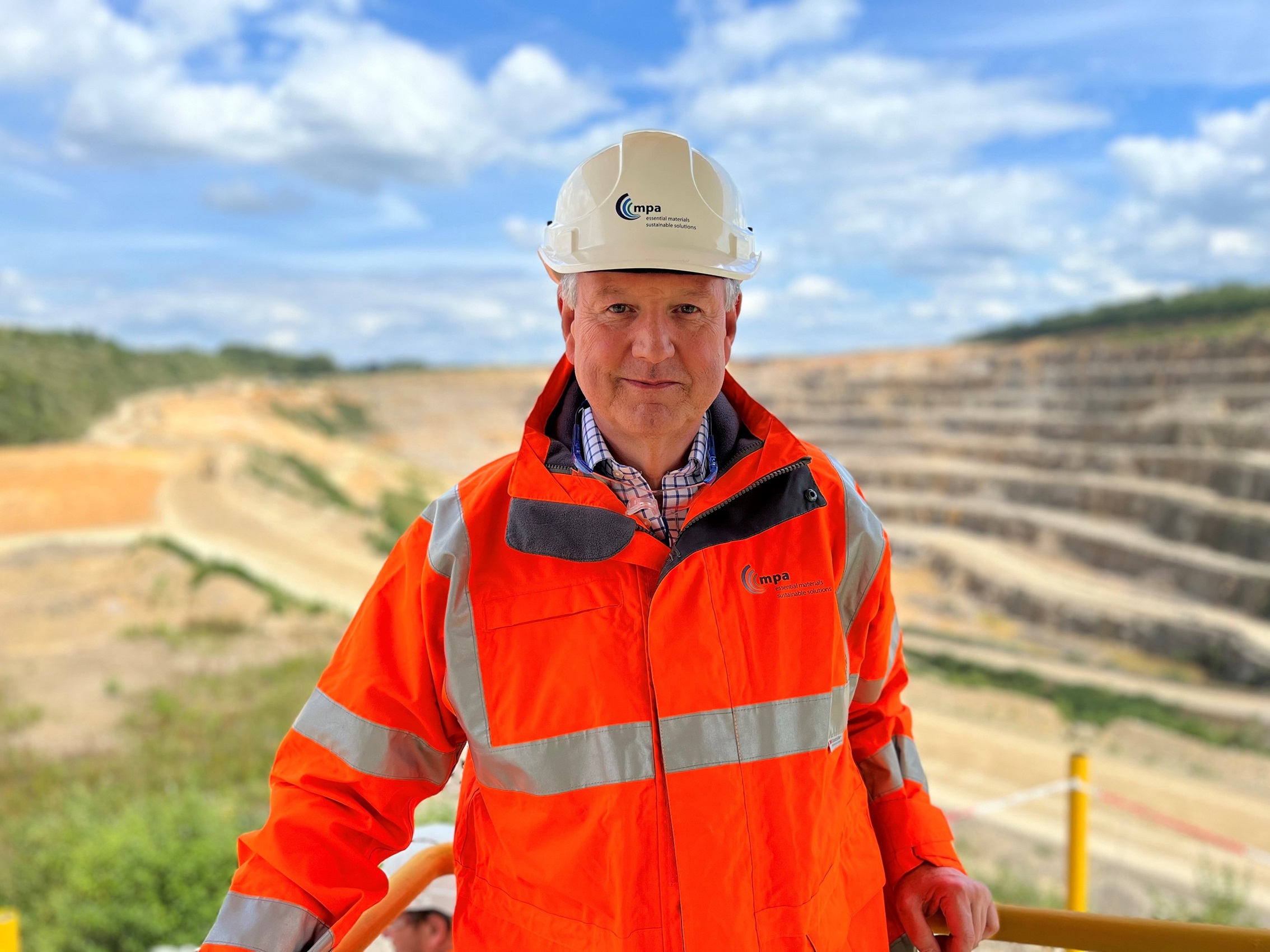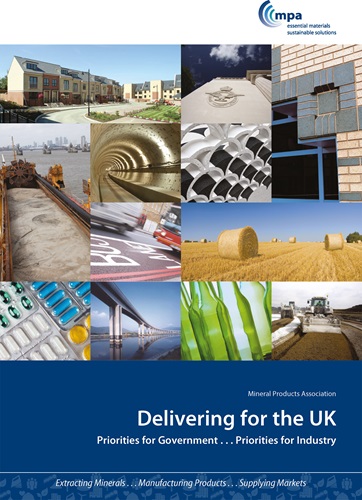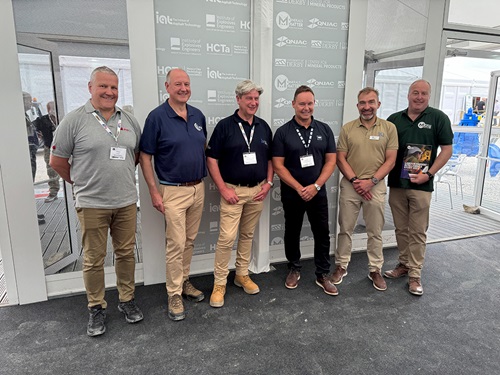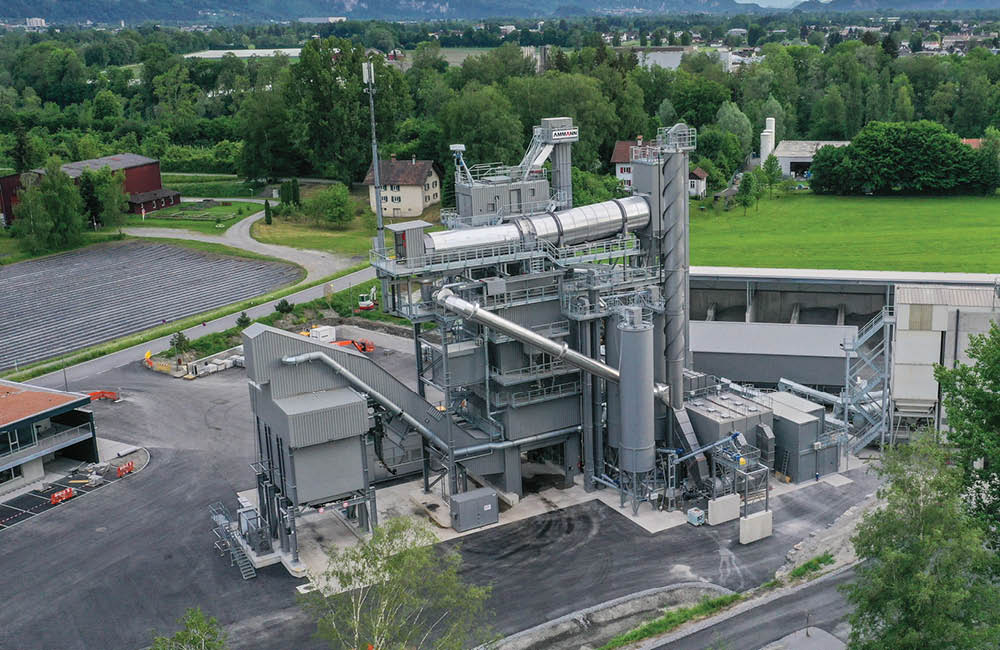
Jon Prichard is the chief executive of the Mineral Products Association (MPA), the trade association for the UK’s aggregates, asphalt, cement, concrete, dimension stone, lime, mortar, and industrial sand industries. He talks to Guy Woodford about the Association’s lead role in addressing key challenges in the British mineral products sector.
Jon Prichard joined the MPA as chief executive in October 2022, succeeding the charismatic, straight-talking and highly respected Nigel Jackson. The central London-headquartered Association made a shrewd choice given Prichard’s wealth of management experience and expertise, most recently as chief executive at the Institution of Chemical Engineers. His impressive CV includes senior roles at the Engineering Council, Consulting Engineers Rendel, and the Institution of Civil Engineers, following 19 years in the British Army—Royal Engineers.
So, what has Prichard taken from his previous career roles to guide his work as MPA chief executive? “I was trained to think two levels up in the British Army. Not what your boss is doing but what your boss’s boss wants. If you know that, and if communication ever breaks down, you know what he (or she) wants you to achieve. It means you don’t need constant fostering to deliver a mission. I’ve found that getting people to think like that is worth the investment.

“I’ve also learned that change is constant. During my first ten years in the army, we were subject to 270-odd defence and other government reviews. We were heading towards the end of the Cold War, and post-1989, there were umpteen reviews and changes. I kept saying to myself, ‘If only they left us alone to implement the last change’, but I reached the tipping point in accepting that wouldn’t happen. Yet I started seeing change as good as it brings about innovation and, often, technological advances. Then, it became more about sitting on the front of the wave and steering its direction of travel. To continue the analogy, the tide of change is happening in this [mineral products] sector and some people still resist it. I see my role as helping the sector be on the front of the wave.”
Asked how he would deem his time as Mineral Products Association (MPA) chief executive a success, he says: “If you look at my career, it has been one of service – whether to the Crown through the British Army or within the engineering profession. Now, I am serving the mineral products sector. Change is necessarily incremental. It is not about ‘Jon was a great chief executive because he did this’. It has to be about picking up the agenda I was left by Nigel and moving the dial further. During the coronavirus period, Nigel was successful in getting the government’s recognition that we are an essential, foundational sector. I would like to take that forward so we continue to be recognised as essential but by a much broader base of stakeholders.”
Prichard highlights one of his early takes as the MPA's chief executive. “It’s been quite an eye-opener for me to develop an understanding of where mineral products come from and the links in the supply chain. Having initially trained as a civil engineer and worked as one at various times, I used mineral products daily, building roads, concrete bridges and other things, but I never used to think twice about where the product came from. It was all about the type of material required, its specification, strength and other performance characteristics.”
The MPA represents most of the UK’s mineral products operating companies across its 14 product groups. These include most independent SME quarrying businesses and nine major international companies. The MPA covers 100% of UK cement and lime production, 90% of British aggregate production, 95% of asphalt production, and over 70% of ready-mixed concrete and precast concrete production.

In 2022, the UK mineral products industry supplied £22 billion worth of materials and services to the British economy. It is also the largest construction industry supplier, with annual output valued at £178 billion. By volume, industry production represents the largest flow of materials in the UK economy and is also one of the country’s largest manufacturing sectors.
“Around 90% of our members’ products go into construction, and the construction industry takes it for granted, as does the government,” stresses Prichard. “But the geology of the United Kingdom is the geology of the United Kingdom. No political policy can change that, so why have we devolved the responsibility for planning and permitting mineral product extraction to local authorities when it’s a national resource?
“When I meet with ministers, one of the key messages I pass on is, ‘Look at the national mineral product flows that have to happen to enable the housing and other construction that you depend on, yet, under devolved powers, these are delivered on a bottom-up basis through minerals local plans’. Some local authorities have made perverse mineral extraction planning decisions during my time at the MPA, for example, councillors refusing an application to open a new quarry due to the climate emergency when mineral products will be essential for the infrastructure needed to decarbonise the economy and mitigate the impacts of climate change.”
Drawing on another key take-away from his professional career, Prichard adds: “Having managed construction projects and been engaged with major works, you look at how you manage construction risk. To get it right, you must make sure that the risk is being managed by the person or organisation best placed to manage that risk. Many government projects have gone wrong as they tried to offload the risk to the contractor, but the contractor could not manage those risks, so either the projects failed or the contractor failed. The biggest example of that would be Carillion.” [Carillion was the UK’s second-largest construction firm and a major strategic supplier to the UK public sector. Its work ranged from hospitals to road construction. Carillion was working on around 420 public sector contracts when it went bust in 2018.]
The MPA’s website lists five key aims underpinning its work: it seeks economic conditions that support investments, better government support for an essential industry, a reasonable license to operate, proportionate legislation and regulation, and recognition of progress.

“A strategic priority for us has been developing our new MPA charter, with the current one due for renewal at the end of this year,” says Prichard. “A key element is getting our sector to align. Without that, we will struggle to convey key messages. MPA member engagement delivers that alignment. The association exists to do things that are better done together, including advocacy via knocking on doors in Westminster and Whitehall and ensuring good relationships with key civil servants.”
Prichard describes the political situation the UK mineral products sector finds itself in as “incredibly challenging”.
“Politicians find it hard at the ballot box to talk beyond immediate needs. The [Conservative-Liberal Democrat] coalition government had an industrial strategy [launched in November 2012], but it fell over when we had a sole Conservative administration [from 2015]. Subsequently, the current [Conservative] government has been unable to combine the various strands of industry needs that will support growth.
“As the [2012] UK industrial strategy noted, we face challenges from an ageing population, the impact of technology, and the energy transition [to renewables] and decarbonisation, all of which are now compounded by global conflict. That heady mix means any government will never have enough resources to do everything that is needed and will respond to those that shout loudest at the time of a public ballot.”
Prichard stresses that short-term European energy price stability will be contingent on a settlement in the Russia-Ukraine war, with medium-term stability via energy transition. “A big concern at the strategic level is the US going independent on energy, reducing their need to prevent other conflicts. There is a huge risk of another isolationist America, particularly if it’s a Trump administration [following the November 2024 US presidential election]. The inter-war years of the last century could be repeating themselves.”

The MPA’s chief executive also notes that global temperatures have already risen by more than 1.5 degrees Celsius above pre-industrial levels despite the international community’s 2015 UN climate change conference agreement to make efforts to prevent this. “Our housing stock is going to struggle, as is our infrastructure and flood defences. You look at London, where the Thames Barrier is closing much more frequently than when it was first designed by a company I used to work for. The Thames Barrier has been reviewed, and it is okay until at least 2080 [with the required maintenance]. But when it was first installed [May 1984], it only operated three or four times a year due to the tidal surge. It is now closing that many more times a year. Southwark is a floodplain. And what happens if the London tube network floods? London would come to a standstill.
“The Environment Agency has identified a number of options to replace it under the TE2100 programme, but how long does it take to procure a piece of national infrastructure? The M25 was first discussed in 1954, but it wasn’t completed until 1985. It took 31 years! Whether it’s due to demographic change or the climate, we will need infrastructure spend.”
Prichard says that the UK and wider society need a good understanding of the energy transition, the variety of alternative energy source options, and the practicalities of delivering alternative energy safely and at scale. “You look at hydrogen and its position in the periodic table. It’s in the top left, which means it is the simplest molecule, has the highest flammability range, burns with invisible flames unless you put additives in, and can self-ignite at room temperature. It’s clear that hydrogen needs to be researched and used in the right way. And if it’s to be our chosen alternative fuel, there is a huge infrastructure imposition.
“Energy density will become an increasingly important issue in commercial vehicles with alternative fuels. All the major manufacturers of [quarry or construction] site plant are producing alternative-power-based machines, but if the customer relies on grid connectivity or alternative energy storage infrastructure while working on a more remote site, there’s cost and complexity that needs to be overcome.
“We’ve been meeting with government departments alongside equipment manufacturers and saying, ‘You need to be very careful on how you manage the energy transition for non-road, mobile machinery. You can’t just assume it will happen. All the equipment manufacturers say they have looked at this and feel they need a government commitment to hydrogen as the sustainable fuel solution. However, even given that, getting the torque ratios [with hydrogen] required by some larger equipment will be hard.”
Prichard says he was “really impressed” after taking up his chief executive role with the UK mineral product sector’s pathway to net zero for cement and concrete. This includes the MNZ/Peak Cluster partnership, which is unlocking private investment and accelerating new routes to market for commercially mature carbon capture and storage (CCS) projects.
MNZ/Peak Cluster says its partnership will decarbonise 40% of the UK’s cement and lime industry and ensure that close to four million tonnes of CO₂ emissions from vital industry within the Peak Cluster will be captured and then permanently stored in Spirit Energy’s MNZ carbon store each year, from 2030.
The partners add that the project is set to generate the equivalent of £1.8 billion GVA (gross added value) by 2050, creating and safeguarding more than 13,000 jobs across Derbyshire, Staffordshire and Cumbria, and attracting a further £5 billion of investment in construction and operations. It will also see a combined annual increase of £154 million in skills uplift and wage increases.
“There is a reliance on government policy to encourage CCS, and we are one of the more advanced sectors in that sense because many industrial sectors have not yet published their net zero pathways. The mineral products sector is on a journey to deliver the required net zero carbon outcomes in the desired timeframe, but it relies on government policy underpinning it.

“The decarbonisation agenda in this country adds an extra layer of cost when you look at cement production. At the moment we are due to implement CBAM [carbon border adjustment mechanism – part of the European Green Deal] a year later than the EU [European Union]. That’s a year when those producers outside the EU who are not subject to green taxation and carbon measurement could sell to the UK. That creates a huge risk of a year that distorts your market. It is hard for markets to recover when you get such a significant distortion. As a result, we are arguing for the CBAM to be introduced in the UK in 2026, at the same time as its EU introduction in order to ensure that a level playing field is maintained.
“There’s also a certainty aspect to this. Because of the energy transition costs, we have higher base and connectivity charges. This also contributes to market distortion. The only people that can pull the necessary levers are the government.”
In January 2024, the MPA published a new document, titled Priorities for the Next Government: Decarbonisation, Growth, Delivery. Based on detailed and extensive feedback from members, it outlines the three fundamental issues the next government needs to address to support the UK mineral products industry: accelerating decarbonisation, boosting economic growth, and delivering critical infrastructure.
“This document is punchy and succinct,” says Prichard, “and because of that we have already had feedback from many spads [special advisers] and others saying that they can put it in front of prospective [parliamentary] candidates and [government] ministers. We also presented it to Sarah Jones, the Shadow Minister for Industry & Decarbonisation, who was very receptive to our straightforward industry messaging.
"Unlike smaller nation-states, where a quarry company owner can go straight to the relevant government minister about a concern, in the UK we have such a diverse population and diverse industrial sectors that we [the mineral products sector] are one of many voices. So being heard among all the noise is a challenge, but it can be done. It comes back to how we demonstrated the essentiality of mineral products during the coronavirus pandemic. This meant that within weeks of the first lockdown quarries and downstream operations were able to restart to feed the construction sector, as the government had already deemed construction to be essential.
“The key challenge is getting the government to recognise that the mineral products industry is, and always will be, essential, not just in the context of a pandemic. That means working with Whitehall so that the visibility of our essentiality gets carried through to all relevant policy areas, such as housing, the environment, and education, the latter relating to building schools.”
Prichard explains that as part of its work to put the UK mineral products sector at the heart of government thinking on the energy transition agenda, there should be material supply audits for big energy transition-linked infrastructure works, such as those relating to the Celtic Sea Cluster, created to help drive market creation for floating offshore wind in the Celtic Sea, the area of ocean situated off the coast of Cornwall, between Wales and Ireland. Floating offshore wind is expected to contribute to creating more than 29,000 UK jobs and deliver an anticipated £43.6bn in UK gross value add (GVA) by 2050 against a 100GW offshore wind deployment scenario.
“You won’t deliver major infrastructure projects linked to the energy transition unless you’ve thought through how you supply the mineral products. Environmental impact studies are carried out, and material supply impact studies should be done similarly,” says Prichard. “Bodies like National Highways and Network Rail are starting to recognise this as an issue. When both HS2 phases began, material supply impact studies were not done, so there was a mad scramble [for building materials]. We need better project delivery. We need the government to understand that if you don’t take that partnering approach with the suppliers, you end up with no one having any certainty, everything is all last minute, and the costs are sky high.
"While minerals are undoubtedly a strategic resource, given the dislocation that occurs between resource availability and market demand, one of the challenges is reflecting this tension between the regional/national need for materials, and local issues through a planning system which operates on a bottom-up basis.
“We live in a democratic society, and you can’t stop people from expressing legitimate concerns, but they must be legitimate. As an industry, we work hard to engage with local communities and help decision-makers shift from short-term thinking into longer-term thinking for the greater good.
“I also believe that the fear of the prospect of a new quarry, especially stirred up by the most ardent objectors, is much more severe than the reality. I grew up in a house in Worcestershire, where sand and gravel were being transported from the fields behind us during different development works.”
The MPA’s quarterly members’ survey detailing sales volumes for primary aggregates, asphalt, ready-mixed concrete, and mortar is considered an important barometer for the UK construction industry. Despite a modest 1.1% increase in primary aggregate sales in the first quarter of this year compared to Q4 2023, the overall trend across all monitored markets remains subdued. This reflects the impact of UK economic stagnation, high interest rates, and a diminishing pipeline of new construction projects over the past 18 months.
Extreme weather conditions, including storms and record rainfall, further compounded the situation at the start of 2024, impacting work on construction sites and demand for building materials. This was expected to result in extended project timelines rather than any significant catch-up in demand during the spring.
“Infrastructure projects have slightly dropped off, with the next set pausing pending the General Election. The long-term demand signal does not go away, but members have difficulty managing the short-term. We’ve had a lack of growth for two years, and housebuilding has dropped by over 30%,” explains Prichard. “Despite Winston Churchill in 1945 identifying a need for housing in this country, the need for housing is still here and now. In the 1960s, we did a lot of council house building, but since then, we’ve been nowhere near hitting an annual housebuilding target. The need for housing gets even more pressing when you look at demographics and lifestyle changes.

“Property prices will not go down until there is enough housing. Governments of any political colour know this, but the difficulty is converting promises into reality. Demand will return at some point, but developers will be cautious. We have built a society with a false expectation of zero interest rates. I remember in the mid-1990s buying a property with my brother in London, and within three years, we were paying a 15% interest rate. Now, we have people who are shocked by 5%. I am hopeful housebuilding will pick up when we have a new [government] administration, inflation is back under control, and interest rates are coming down.
“We’ve got a National Infrastructure Commission (NIC) and the Infrastructure and Projects Authority [the UK government's centre of expertise for infrastructure and major projects] that advise on what to invest in. Sir John Armitt [chairman of the NIC] was furious when HS2 Phase 2 was canned. It was a poor decision because of all the allied infrastructure that went with it and the investment uncertainty it created. I think the message has been conveyed that you need certainty to secure investment. The National Infrastructure Commission’s role should be reinforced so that its advice has more weight, giving certainty over longer-term plans.”
In the Winter 22/23 issue of Mineral Products Today, the MPA’s official magazine, Prichard urged the UK mineral products sector to use ‘big data’ more effectively. Does he think there has been progress on this? “Before I came to the MPA, I worked with chemical engineers in Australia. They were using big data to optimise processes: instead of waiting for something to happen, they were predicting it. Everything from when a valve on a pipeline will need replacing to scheduling a conveyor belt replacement based on monitoring the belt’s thickness. The extractive sector there operates at a greater scale, but there are some larger company adopters in the mineral products sector. This technology will become more affordable and help our sector be more efficient. I went to a [mineral products] loading wharf on the River Thames, which had lost the ability to unload the barges for three days due to an unplanned conveyor belt shutdown. That’s a huge cost! It’s also about creating a culture that encourages a company’s team to look more at what can be done with their machines to enhance operating processes.”

I am keen to get Prichard’s thoughts on efforts to attract the next generation of talent to the mineral products sector. In a competitive careers marketplace, will the sector get the talent and skills it needs for a vibrant future?
“It is hard for many of our members to recruit the next-generation workforce, and I think that’s based partly on the lack of visibility of the mineral products sector compared to others, but also outdated stereotypes of what it means to work in our industry. Yet we employ more than 80,000 people directly in the widest possible range of roles. There’s a job for everyone in mineral products with many skills and competencies transferable, and the industry is one of those that people often stay in.
“The reality is that the workforce knows about jobs they have had engagement with: they have all been to a shop, school, hospital and so on, and everyone buys everyday goods online. Every family buys food, clothes, electronics, but not every family buys concrete (at least not directly!) That’s compounded by the fact that schools are ill-equipped to advise on careers, yet they have responsibility for that, whilst colleges and universities are often misinformed.
“To attempt to address this we got together with the MPQC [Mineral Products Qualifications Council], IQ [Institute of Quarrying], the I.M3 [Institute of Materials, Minerals & Mining], and MAUK [The Mining Association of the United Kingdom], and we wrote to university vice-chancellors after seeing that courses were being canned due to them being deemed to relate to an ‘irresponsible sector’.
“Some had allowed the ideology that, ‘Any resource-consumption sector is bad’ to prosper, which completely fails to acknowledge the importance of minerals in society and the economy today and also their role in the transition to net zero. So far, our actions have led to good interaction with several vice-chancellors who admitted that their universities had not thought much about this.
A big champion of collaboration, Prichard stresses his good relationship with James Thorne, the CEO of the IQ and the MPQC. He is also a big supporter of Minerals Matter, a resource for young people and adults thinking about career options to discover what it’s like to work in quarrying, mining, mineral products, and mineral processing.
“The MPQC is responsible for the national [mineral products industry] qualifications framework, and a provider, alongside others, of qualifications. The IQ is the national industry’s professional body. If you look at the national qualifications framework, there are seven levels. Making sure we have the ladders and bridges within those levels is important. You go to some quarry plants and sites, and you can see three generations of the same family working there. That’s not uncommon across the sector. They brought their family to work.
“There are three things to a psychological work contract: reward, progression and job satisfaction. Regarding job satisfaction, you speak to people working on sites, and they enjoy what they are doing. There are lots of different roles across the sector. Recognising individuals in those roles through the national qualifications framework shows progression can happen. In our sector, you can go from operative to managing director, and we have many examples of this among our members. This industry is unparalleled when it comes to opportunity, both here in the UK and overseas too, and that should be celebrated.”













